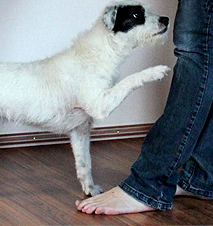Hearing dogs take on hearing abilities for their severely hearing impaired or deaf partner, and notify them of noises in the area. Hearing dogs change the lives of deaf or severely hearing impaired adults and children in many ways. Deafness can be a very isolating and lonely disability.
- Tasks of a hearing dog
The tasks of a hearing dog are determined on an individual level, according to the needs of the partner. Some of a hearing dog's duties include notifying the partner when the doorbell, alarm clock, telephone, kitchen timer or smoke alarm sounds, or notifying them when a baby or child is crying or when their name is called, as well as making them aware when something has fallen down. Hearing dogs who work with children also learn to convey messages from the parents to the child.
- Scientific studies on hearing dogs
In 1994 the University of Arkansas carried out a study, in which 550 hearing dog owners took part. All the hearing dog owners reported an improvement in their living situation in the following areas: being aware of noises, less loneliness, less depression, more security, more self-confidence, more social contacts and greater independence.
In 1995 the University Davis in the USA carried out a study with 38 hearing dog owners. 76% of the participants reported that their relationships with neighbors and other people they interacted with had improved. The organization "Hearing Dogs for Deaf People" in England carried out a study between 2003 and 2006 with 51 hearing dog owners. They looked at the social and psychological effects of hearing dogs. According to the study, the presence of the hearing dogs noticeably improved the owners' feelings of anxiety, the sense that they were not safe in their own homes and their fear of cars.
Social isolation, dependence on other people and loneliness also saw a significant improvement due the hearing dogs.
In 2008 the same organization carried out a study on the benefits of hearing dogs for deaf children. The children who took part in the study were between seven and twelve years old, and received a hearing dog from the organization. The study showed that the hearing dogs consistently had extremely positive effects on the children. The safety fears of the parents were reduced dramatically. Since receiving the hearing dogs, the children could sleep better, found contact with other children the same age easier and had improved self-confidence. The children showed improved behavior in school, as well as better grades, better speaking abilities and a greater acceptance of hearing aids, and family life also improved.
In 2008 the Baylor College in Texas carried out a study with hearing dog owners. The participants reported that, since they had had the hearing dog, they were less reliant on the help of others, and that their relationships with friends and family had improved. They identified the greatest advantage as being their improved ability to cope with everyday life, due to being notified of noises by the hearing dogs.
- Preconditions for having a hearing dog
- You should be severely hearing impaired or deaf, and limited enough in your daily life that you feel a hearing dog could help you. If you live with a hearing partner or family member, the hearing dog should still be able to carry out its tasks.
- The hearing dog is the only dog in the household, so that other dogs don't distract it from its work. Other animals such as cats do not present a problem.
- If the hearing dog is for your child, he or she must be at least six years old.










